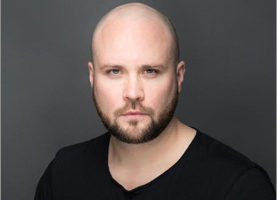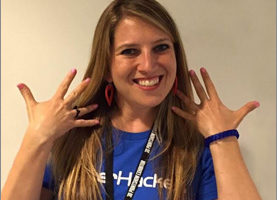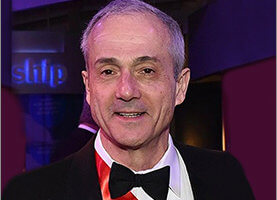In this podcast, Dr. Moshe Szyf, perhaps one of the greatest minds in the interesting field of epigenetics, discusses the complex and important field of social epigenetics.
Dr. Szyf has a PhD from the Hebrew University. He completed an intensive postdoctoral fellowship in Genetics at Harvard Medical School, then continued his studies and research through his James McGill Professorship and GlaxoSmithKline-CIHR Chair in Pharmacology.
In the field of epigenetics, Dr. Szyf has amassed 40 years of scientific research focused primarily on understanding how select genes can be programmed. Dr. Szyf’s lab has pioneered many methods and techniques and was an early voice in the proposal that DNA methylation is a therapeutic target specific to cancer and other diseases. Their groundbreaking work helped to launch the field of social epigenetics.
Dr. Szyf recounts some observations of rats that were essential to his lab’s work. He relates how rats that clearly lick their pups more often are actually changing their pups’ lives. As these pups that have experienced high maternal care become adult rats they will then have a variation in stress responsivity and characteristics. Dr. Szyf’s lab is extremely interested
in these behaviors and how they alter the programming of genes.
Dr. Szyf discusses proteins, DNA, and the many factors that can alter genes and gene programming overall. Dr. Szyf discusses how epigenetics can provide a better understanding of aging as well as disease development. He talks about changes in cancer cells and the many alterations in a wide range of genes. Dr. Szyf explains the epigenetic approaches to prevent or intervene in cancer that may possibly allow for an alternative approach in lieu of the standard methods, many of which are quite toxic.
Richard Jacobs: Hello, this is Richard Jacobs with the future tech and future tech health podcast. I have Dr. Moshe Szyf. He received his Ph.D. from Hebrew University in a postdoc scholarship in genetics at Harvard medical school, currently holds a professorship at Glaxo Smith Kline, Taryn Pharmacology. Many, many accolades here. And we’re going to be talking about his work on social epigenetics. I am not sure what that means, Moshe welcome. Thank you for coming.
Dr. Moshe Szyf: Thank you for inviting me.
Richard Jacobs: What is social epigenetics or I guess more simply what your current work is about?
Dr. Moshe Szyf: I have been working on epigenetics for the last 40 years and trying to understand essentially how genes are programmed and how different experiences in life changed the way genes are programmed and that lets us to social epigenetics, realizing they’re not only chemicals and hard stuff. It can change the way genes work, but also social experiences can change the way genes work. And that created for the first time a link between social sciences and hardcore DNA.
Richard Jacobs: So, okay. If I smoke cigarettes or if I work out a lot at the gym, I’m turning on and off genes are affecting my epigenetics. It doesn’t seem too farfetched and wondered what if I sat there and meditated and did this for a period of weeks or months or years that would affect my epigenetics. But when you’re talking about the social side of it, what have you seen that maybe is surprising, how can people affect their gene expression in simple ways?
Dr. Moshe Szyf: We need to differentiate between two ways by which genes can be affected. One is of course if you were exposed to something you turn on and turn off genes, that’s what genes are supposed to do. But that’s not what we are talking about, we’re talking about changing how the genes are programmed forever or for a long time. So you’re exposed to a cigarette now and then 20 years down the line, the effects of that cigarette will be seen on your gene. That’s epigenetic programming indifference from just programming gene expression, which is the immediate response to exposure to a cigarette. And so in a certain way we’re changing the way our genes are by experiences that extend well beyond the time that the experience had appeared, which means that everything has a consequence and the consequence is not just the heated consequence. For the first time, we noticed that it’s not just chemicals that can do that. Although even that took a long time to understand that exposures don’t only change things immediately, but actually change the way genes are programmed for a long time. And perhaps even for many generations. It was an experiment that we did here at McGill with Michael Leni where we looked at maternal care in rats and how differences in maternal care in which is a very classical social behavior affect the way the animals will develop. So when the animals that are adults, they’ll have completely different characteristics based on the way their mother treated them years before. And we asked the question, how is this possible?
Richard Jacobs: Yeah, I think I heard about this. There were rat mothers that licked their pups. Can you go over what happened in the experiment again?
Dr. Moshe Szyf: It was first an observational study that rats that lick their pups and more frequently their pups wanted to grow to become adults. They will have different stress responsivity, different phenotypes, and different characteristics. And then rats that were not treated as frequently. So high maternal care shapes the lifelong behavior and physical characteristics of their offspring. And how is that possible? Right. So we tried to understand how is it possible that this works we still believe that everything is somehow connected to where the way genes work. So the reason that what is happening is that the maternal behavior, it’s changing the way genes are programmed in the pups, and that really launched this field of social epigenetics when we discovered epigenetic changes that are initiated by maternal behavior but then remain well after the mother is dead.
Richard Jacobs: Well, I mean, in humans if you beat your children, you abuse them, they tend not to grow up and you’d be too well adjusted. So similar phenomenon I guess different creature. But some I guess would try to say, oh that’s just their mental responses and that physiological changes. So you’ve observed literally different physiology?
Dr. Moshe Szyf: We observed differences in the chemistry of DNA. And so they are not just hand waving, kinds of things happen. The question is how do they happen and why do they happen.
Richard Jacobs: When you say changes in the DNA, is that mean like different methylation patterns? Different if there could be a sterilization pattern?
Dr. Moshe Szyf: Yes. Exactly.
Richard Jacobs: Wow. Okay. You see different changes in the underlying DNA itself or just?
Dr. Moshe Szyf: No, the sequences did not change. And here’s the thing, we didn’t hurt. There is a sequence that was for life and it stays the same in every tissue in our body that cannot change, but the way they work can change. And you know, before that the main emphasis was on genetics, genetic differences that can explain the psychological, behavioral, social difference. But what we discovered is that the overwhelming force is not really the genetic differences on how your genes are put to work and by experience.
Richard Jacobs: How do you profile someone epigenetically, I would think every different cell type reacts differently or do a lot of them act in concert under stress response?
Dr. Moshe Szyf: So there are things that are different and things that are same has to do with the job of the gene. Certain genes need to work in the same way and across the shoes and others are highly specialized and stress is something that covers their whole body, although it will have different effects in different tissues. Stress affects the immune system. It affects the brain, it affects fat, it affects metabolism. So it’s integrated across the body. And therefore it’s not surprising that you’ll find some changes in DNA methylation that will be common to a lot of tissues and others that will be different.
Richard Jacobs: So in determining this, how many different cell types did you look at? And you looked at all of them, so maybe you did a subset and you said, all right, well, it’s probably likely that supplies to all of them.
Dr. Moshe Szyf: Although we would love to do it, it’s just a financial issue. That’s a project that will cost them the billions, but them what one can do. And what we did is we first looked only in the brain and we only looked in very specified areas of the brain that are highly responsive and controlling stress. But then we found that it’s not just the brain to our surprise, the immune system was also affected. And so we looked at the immune system and the brain. Other people look at fat tissue and muscle tissue. You’re quite limited look what’s accessible. It will be extremely difficult to look at the thousands of cell types, how they respond to this kind of social signals early in life and how these signals evolve during life.
Richard Jacobs: So what have you figured out? What’s the mechanism of epigenetic change and make it out any of the mechanisms and what the pathway would be?
Dr. Moshe Szyf: This is an area that is investigated, wipe them aggressively by a lot of people. In the original study, we kind of deciphered that there is some sort of a pathway leaving between maternal behaviors. This is an area of active research by many groups trying to figure out how experience leads to a very particular change in the way genes are marked. In our initial study and follow up studies we focused on the stress response pathway and how maternal behavior elicit certain hormones. So neurotransmitters in the brain like for example, Serotonin, which is released when you feel good and that neurotransmitter acts on what we call receptors, proteins that can receive the signal and then a series of proteins that are connected to each other and leading to what we call transcription factors, which are proteins that can find addresses on DNA. The same way a postman can deliver a mail to a specific address. They can read the Zip codes on the DNA and target DNA grooming enzymes to particular sites. So this way the maternal behavior ends up in particular addresses in the genome.
Richard Jacobs: How would it know where to go in the genome and edit, this one part of the genome? How does it know that part is the right part to mathlete for instance? And adding to know that that part may not be used for other types of genes in gene expression to make the perky expression of other ancillary genes. Cause it uses a common area that other genes use.
Dr. Moshe Szyf: None of the systems is perfect but it’s the combination that creates the perfection and that evolution has probably generated transcription factors that on one hand can recognize specific DNA addresses, on the other hand, they can be kicked in the head by the signals coming from the outside world. And not all cells are going to change. And so which cell types are responsive to that signal, so in the hippocampus there, millions of neurons, only some of them will change. And why these neurons and not others this is why we have evolved is through, have figure out these things by trial and error, which are the things that increased fitness and the others that don’t and transcription factors can read very specific addresses in the genome. They can also talk to signaling that comes from the surface of the cell so they can connect the surface of the cell with the genome. Did we add understand everything? No, the complexities of course not, but we have some hint of how these things work.
Richard Jacobs: What are some elements of this whole system that you’d love to understand, for instance, what is indexing system and what about that, let’s say as an example, one of the elements of this whole epigenetic change, you said, it seems that there seems to be the ability for top pounds to index the DNA and to go to a very specific location and know that’s the right location to do their work.
Dr. Moshe Szyf: This mechanism is very, very well known. So transcription factors and the way their protein is structured, they can see certain sequences. So we have evolved a whole battery of transcription factors that can go to different parts of the DNA. And how all of this makes sense within a complex of an environment. It’s very complicated. It’s beyond my understanding even how to approach and because we have a combination of things that happened. How things can see specific addresses in the DNA. How this is good for us. And how an early experience knows that sending the transcription factors to these places in these cells is what will increase their fitness or their survival or the long term wellbeing. We don’t understand that. And that probably required trials and errors of evolution to figure this out.
Richard Jacobs: So what in particular are you focused in on? What do you want to elucidate? Is it the overall ability of this to happen at all?
Dr. Moshe Szyf: We’re interested in different questions. One question is how to take advantage of this two to predict and disease early. And this is one area that I’m very interested in. The second area is how to take this to therapy, how to apply epigenetic principles and intervention. And the third area, of course, is still we, there are many open questions about how methylation affects gene expression and how other forms of modification like hydroxylation formulation affect gene expression. So there are a lot of the mechanical questions that are still open that leads to needing to be understood. But I would like to jump and then move forward without understanding everything and seeing how we can use it to predict disease early and to prevent them.
Richard Jacobs: Well, for instance, how would you envision using it to predict disease?
Dr. Moshe Szyf: For example, can we predict Alzheimer early. The methylation signals that tell us that person is developing Alzheimer’s and if we can do that, there are many probably already available therapies that might work. And the failure of Alzheimer’s treatment is not that the drugs are not good, is that when a person knows they have Alzheimer’s already the brain is dead. And so it’s very hard to, to treat the dead brain. But if you can capture before the brain has died or before the parts of the brain that are important to have died, then some treatment might work. If you look at cancer, cancer is a disease that could be cured if detected early, but in most cases of death, the causes of cancer are late detection. Can we detect it early? If you look at aging, which is another aspect where epigenetics is actually driving the process. If we can detect acceleration of aging early and perhaps certain interventions could prevent that from happening. So there’s so much to do and so many opportunities and using those programs to detect disease early and to and to intervene and prevent deterioration.
Richard Jacobs: What appears to be the most direct link to epigenetic change? Is there a particular condition that’s been identified as having a radical effect on epigenetics? Are you looking for ones that have a very specific effect on epigenetics and only effective few discrete areas? So against them, you can elucidate the mechanism by which some kind of disease causes a change or was correlated with a change in epigenetics, then it might be a good way to attack it.
Dr. Moshe Szyf: Of course. So in cancer, this is quite developed, a lot of epigenetic changes that are involved in basic processes that driving cancer. And of course, there is already attempts to try different therapeutic approaches, you’re mixing two different things is one is early detection, which really doesn’t care if it’s connected to the mechanism as long as it works. And the second one is treatment, which tries to reverse changes that are important for the disease. In both areas, progress is made. We’re not looking for specific things. We’re looking for treatments that can essentially shake the epigenetic system and kind of reverse it the more tolerable state. The epigenetic system is affected by everything in our life. So there’s no particular thing that affects it. At some point, it changes in a way that is not good for us. And the question is how do we bring it back? And there are also many different things that can bring back the epigenetic system from nutritional supplements to exercise lifestyle changes and other things. And these are things that need to be worked out.
Richard Jacobs: Well. Do you understand how, for instance, epigenetic change can happen? You need to understand that to undo it, I would think, and then you look for a specific change and try to watch and figure out all the steps in which they happened and then try to undo them or prevent that from happening.
Dr. Moshe Szyf: Right. Of course, we want to understand this, but I’m not sure that will help us undo them. I think the way the system work is as a system, so it’s not like there’s one change happening, there are multiple changes happening. And it’s not the specificity of the change, but it’s the specificity of the combination. It’s a setting of the network. And so you want to reset the network. It’s very different than fixing one or two changes. And the way to reset the network is probably by shocking the network. And this is where trying to figure out, what are the shocks that we can shock the network. Exercise is resetting a whole network and differences in diets are really setting networks, going to a vacation, it’s probably reset the networks and to figure out the combination of reset that we need to achieve a better state of the network does the challenge. So we have to move from the classic way of thinking about the specific change and the specific outcome to systems and resetting two different states. This is the main challenge in this field.
Richard Jacobs: What about in cancer? I mean, I would think that cancer cells change their expression, but that’s happening within a given population of cells. So I’m sure they’re interacting with the network around them. But it seems like the cells are the ones that are doing the measuring and the adaptation at the individual cellular level in cancers. From there. Perhaps that’s an easier way to figure out how this could happen or be undone is by looking at cancer. Because again, it seems to be less of a systemic response or a very, very small system. The tumor itself for instance,
Dr. Moshe Szyf: I’m not sure about that. And so I think that’s the classic way of looking at it. But even in cancer when you look at the methylation system, the change is thousands not talking one. And so we can reset the system by sometimes simple manipulations and so the idea that yes, there are certain cancers that develop certain surface molecules that could be targeted by drugs and that isn’t really working well. But overall cancer is a systemic change in the way different genes are working. And so a more basic approach to treat it is to figure out the way, how do we set that system? And also cancer is not just the disease of cancer cells. It’s becoming very clear that the immune system is highly involved in cancer and some of the new therapies actually target the immune system. The immune system is all over the body and then the immune system is also regulated by the brain and by other experiences. So at the end of the day. I think we’re moving from the reduction as the approach to a more holistic understanding of how the system works and trying to figure out how to alter the system. I believe that holistic solutions will be probably much more powerful than what we have now.
Richard Jacobs: Well, it just seems to fly in the face of the Darwin is dog Ba and for instance cancer, oh it’s a random mutation that happens in a single cell. Well, that’s a system, that’s the single cell. It’s not a system. It doesn’t seem to be odd, this is an adaptive response, a purely adaptive response. It’s not a random thing.
Dr. Moshe Szyf: It’s not clear that cancer actually, it triggered by mutation as some cancers are, others probably not. And again, it’s not clear that one mutation can drive cancer and probably that’s not true. And is cancer really a selection or is it a defect in the immune system? Are cancer cells unnatural or they’re part of the natural system that goes out of balance and within the genome, again, we were talking about thousands of thousands of genes that are changing and the problems with curing cancer is the redundancy of the system is that we are trying to target molecules rather than targeting systems and so one of the things that works the best is chemotherapy because it really targets the whole cell. It kills the cell. And so specialized targets work in very few cases.
But overall, every cancer cell is a systemic change when you look at methylation profile of a cancer cell you can see an enormous change in many, many genes, all of which are important for cancer survival. A cell is a corporation. And to change the strategy of a corporation, you can’t change just one guy. You have to change everybody in the system. And cancer is a complex system and cancer interacts with the somatic cells around it as well as with the immune system and the immune system interacts with everything else. So I think cancer is not just the molecular Darwinian selection, but it’s a defect in the system. We’ll need a systemic solution.
Richard Jacobs: Well, that’s good. I didn’t think so either. So that’s good. What would be a super happy result for you to achieve or figure out in the next few years?
Dr. Moshe Szyf: Super happy will be, can we find the predictors of cancer that will allow us to detect cancer extremely early and prevent the death and morbidity that is caused by cancer. Could we use a systemic epigenetic approach that can prevent or intervene in cancer without you having to resort to the poisons that were treating a cancer patient? And it’s similar for the mental health system. We have an epigenetic approach that will reverse drug addiction or a PTSD or chronic pain. These are the questions that we’re trying to deal with.
Richard Jacobs: Okay. Well, excellent. Well, what’s the best way for people to find out more to read papers that you put out to get in touch?
Dr. Moshe Szyf: We have websites. There is a company that I built just to deal with these clients called HKG Epitherapeutics and so www. hkgepitherapeutics.com. It has a lot of information. And of course, any search in pub med with my name will come up with all the papers.
Richard Jacobs: Yeah. You have an unusual name. So it should be pretty easy to find.
Dr. Moshe Szyf: Very, very unusual. So probably you’ll find only my papers.
Richard Jacobs: Yeah. Excellent. Well. Moshe Thank you for coming on the podcast. I appreciate it.
Dr. Moshe Szyf: Thank you. Bye.
Podcast: Play in new window | Download | Embed











